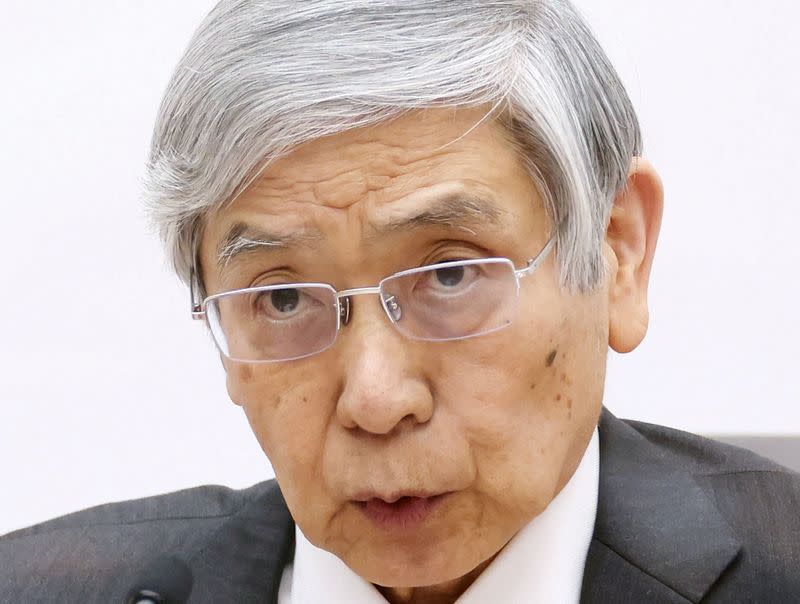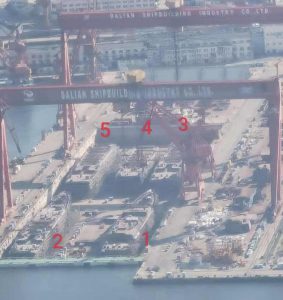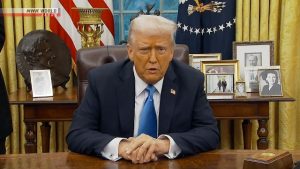The Bank of Japan shocked markets on Tuesday – and knocked the Nikkei share index down by 2.5% – after it announced a tweak to its bond yield controls.
The move aims to allow long-term interest rates to rise more, to ease the cost of prolonged monetary stimulus.
Shares sank in the afternoon trading session, while bond yields and the yen spiked, with the currency hitting a four-month peak, after the news was announced.
The decision came as a shock for some investors who had expected the central bank would not change its yield curve control (YCC) until Governor Haruhiko Kuroda steps down in April.
The BOJ said it wanted to breathe life back into the dormant bond market, so it decided to allow the 10-year bond yield to move 50 basis points either side of its 0% target, wider than the previous 25 basis point band.
But the central bank kept its yield target unchanged and said it will sharply increase bond buying, a sign the move was a fine-tuning of existing ultra-loose monetary policy rather than a withdrawal of stimulus.
“Maybe this is a baby step to test out the strategy and see what the market reaction is, and how much it’s reacting,” said Bart Wakabayashi, branch manager at State Street in Tokyo. “I think we’re seeing the first toe in the water.”
ALSO SEE:
Japanese Against Tax Raises For Military Expansion: Survey
As widely expected, the BOJ kept unchanged its YCC targets, set at -0.1% for short-term interest rates and around zero for the 10-year bond yield, at a two-day policy meeting that ended on Tuesday.
The BOJ also said it would increase monthly purchases of Japanese government bonds (JGBs) to 9 trillion yen ($67.5 billion) per month from the previous 7.3 trillion yen.
“Through these steps, the BOJ will aim to achieve its price target by enhancing the sustainability of monetary easing under this framework,” the BOJ said in a statement, signalling that the move was aimed at prolonging YCC rather than phasing it out.
The Nikkei share average slumped 2.5%, as said, while the dollar fell 2.7% to a four-month low of 133.11 yen. The 10-year Japanese government bond (JGB) yield briefly spiked to 0.460%, close to the BOJ’s newly set implicit cap.
Already, markets are guessing what the BOJ’s next move could be as Kuroda’s term draws to an end and with inflation expected to remain above its 2% target well into next year.
“They’ve widened the band, and I guess that came earlier than expected. It raises questions as to whether this is a precursor of more to come, in terms of policy normalisation,” Moh Siong Sim, a currency strategist at Bank of Singapore, said.
“The writing’s on the wall that perhaps the sharp yen weakness that we’ve seen previously was uncomfortable for policymakers… it’s clear that it adds to the yen strength story next year.”
Kuroda Explains Move
At a press conference later, Kuroda said: “Overseas market volatility has heightened from around spring … While we have kept the 10-year bond yield from exceeding the 0.25% cap, this has caused some distortions in the shape of the yield curve. We, therefore, decided that now was the appropriate timing to correct such distortions and enhance market functions.
“We are aiming to achieve inflation target stably and sustainably accompanied by wage hikes. That will take some more time. It’s premature to debate specifics on changing the monetary policy framework or an exit from easy policy. When achievement of our target comes into sight, the BOJ’s policy board will hold discussions on an exit strategy and offer communication to markets.
“Today’s step is aimed at improving market functions, thereby helping enhance the effect of our monetary easing. It’s therefore not an interest rate hike.
“This change will enhance the sustainability of our monetary policy framework. It’s absolutely not a review that will lead to an abandonment of YCC [yield curve control] or an exit.
“Consumer inflation is expected to slow and likely will fall short of 2% as a whole in the fiscal year 2023. As such, I don’t think we need to review YCC or quantitative easing for the time being.”
The BOJ’s ultra-low rate policy and its relentless bond buying to defend its yield cap have drawn increasing public criticism for distorting the yield curve, draining market liquidity and fuelling an unwelcome yen plunge that inflated the cost of raw material imports.
Kuroda has repeatedly said he saw no need for the BOJ to tweak YCC, including taking immediate steps to address the side-effects such as the distortion it was creating in the bond market.
- Reuters with additional editing by Jim Pollard
ALSO SEE:
Japan to Double Defence Outlay for $320 Billion Military Build-up
Japan’s Imports Surge 45% to Record High on Weakened Yen
Why Japan Has Fallen Out of Love With a Weak Yen
























